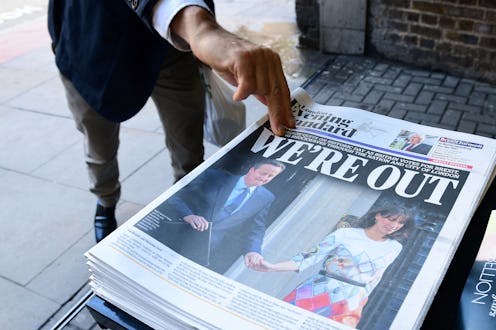News
David Cameron Has No One To Blame
It was a miscalculation of epic proportions. Britain voted to leave the European Union in a historic vote Thursday that ended with the resignation of British Prime Minister David Cameron. In many ways, however, Cameron has no one to blame but himself for both the Brexit and the abrupt end of his political career. Three years ago, he hung his re-election on a promise to allow a public referendum on Britain's status in the EU. He gambled, and he lost.
To appease a growing Eurosceptic faction of his Conservative Party ahead of his May 2015 re-election, Cameron vowed in January 2013 to hold an in-or-out referendum on Britain's EU membership should he be elected to serve a second term as prime minister. At the time, it seemed a low-risk gamble, but with the U.K. Independent Party — one of the biggest supporters of the Leave campaign — on the rise as the vote drew nearer, it became increasingly clear that fear had divided Britain on whether to stay or go. In the end, nearly 52 percent of Britain voted to leave the EU, spurring Cameron to resign as prime minister Friday with four more years left in his term.
"I was absolutely clear about my belief that Britain is stronger, safer and better off inside the European Union," Cameron said in a speech made outside 10 Downing Street on Friday. "But the British people have made a very clear decision to take a different path and as such I think the country requires fresh leadership to take it in this direction." Cameron said he would stay on as prime minister for the next three months to allow a stable transition of leadership. "I will do everything I can as Prime Minister to steady the ship over the coming weeks and months but I do not think it would be right for me to try to be the captain that steers our country to its next destination."
Many called Cameron's desire to allow a public vote on an issue as complex as Britain's EU membership irresponsible. "How dare you entrust such an important decision to ignoramuses like me?" British author and scientist Richard Dawkins wrote in an op-ed for Prospect magazine. "I don’t have a degree in economics. Or history." Others accused Cameron of jeopardizing the country to save his political career. Cameron dismissed those criticisms, calling the vote "a great festival of democracy." He was an aggressive advocate of Britain remaining in the EU from day one, warning a breakup with the EU would negatively impact Britain's economy and global influence.
Even if Remainers had won out at the polls on Thursday, Cameron seemed destined to walk away from the Brexit referendum having gained little and lost much. In a YouGov poll taken in May, a whopping 82 percent of respondents reported feeling they could no longer trust Cameron on the Brexit issue, a score that lagged 13 points behind Boris Johnson, the former London mayor and outspoken Leave campaigner. With Cameron's exit imminent, some think Johnson will succeed him as prime minister.
Already, there are many who fault him for Britain deciding to sever is 40-year alliance with the European Union. The Brexit blunder will certainly overshadow whatever legacy Cameron may have been able to claim, leaving him fighting off claims he's "the worst prime minister" as he prepares to leave office. Indeed, the next few months will ultimately determine how history remembers Cameron. In calling the Brexit referendum, has he made himself the man responsible for Britain's breakup?
